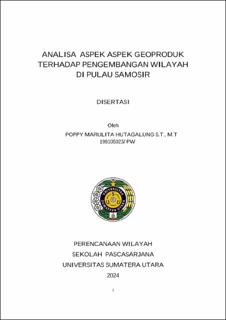Analisa Aspek Aspek Geoproduk terhadap Pengembangan Wilayah di Pulau Samosir
Analysis of Geoproduct Aspects on Regional Development in Samosir Island

Date
2024Author
Hutagalung, Poppy Marulita
Advisor(s)
Nasution, Zulkifli
Rujiman
Ginting, Nurlisa
Metadata
Show full item recordAbstract
Efforts to develop a sustainable region pay attention to integrated socio-economic, ecological and institutional aspects, aiming to improve the welfare of the community with the concept of inclusive development, involving various components of society where tourism activities are directly related to these aspects. Geotourism, one of the fastest growing tourism segments globally, takes place in a geopark area with the
concept of sustainable development developing Geoproducts as geotourism products,
as tourism products inspired by geodiversity in a geopark. In 2020, the Lake Toba
area, especially Samosir Island, was designated as a member of the UNESCO Global Geopark (UGG). This is a challenge for the development of Geoproducts in geotourism on Samosir Island.
Geoproducts have a special philosophy that differentiates them from other tourism
products, namely: geological relationships; economic feasibility and partnership
relationships as well as brand as the identity of a geopark area and in the context of sustainable regional development have development aspects, namely Geological Relations, Economic Feasibility, Partnership Relations and Brands as tools for geopark promotion in geotourism.
With mix method research through SEM PLS analysis, a model was formulated to understand the influence of Geological Relations; Economic Feasibility, Partnership
Relations, Brands for Regional Development through Geoproduk mediation on
Samosir Island, especially on the supply side from Geoproduk Actors.
The results obtained show that Geological Relations; Economic Feasibility and Brand have an influence on Geoproducts, but have no effect on Partnership Relations, whereas Economic Feasibility, Partnership Relations and Brand have no influence on Regional Development. Geological Relations, Economic Feasibility and Brand through Geoproduct mediation influence Regional Development but not Partnership Relations.
The conclusion can be drawn that various Geoproducts as tourism products cannot yet be declared true Geoproducts because they do not meet the philosophy in implementing Economic Feasibility, Partnership and Brand Relationships in carrying out an important role in balancing sustainable development through inclusive tourism. This condition is a suggestion and recommendation for the future
development of Geoproducts in the Kadera Toba Geopark.
